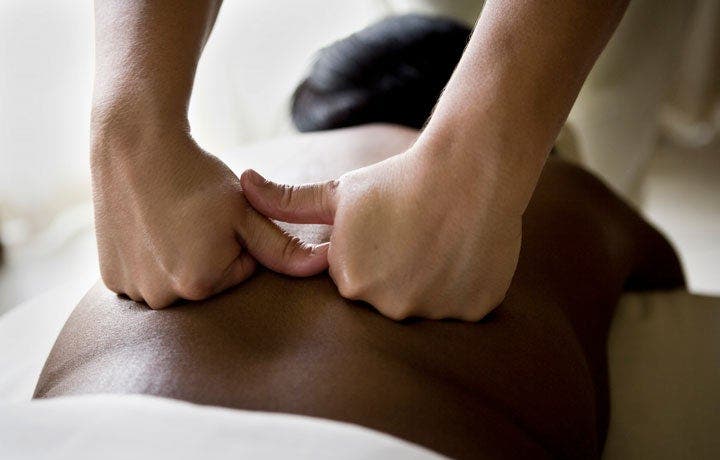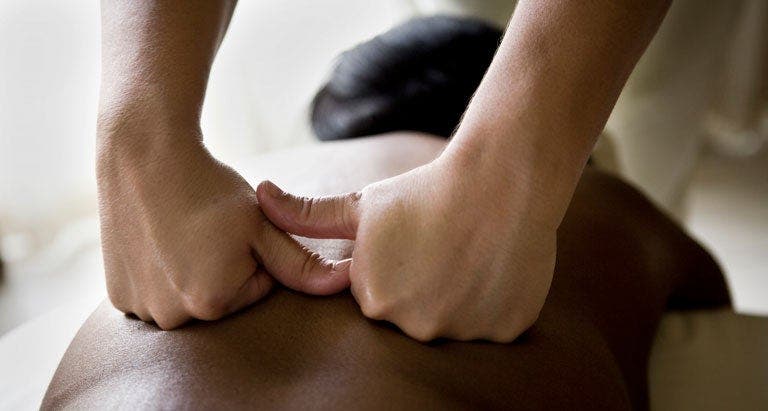Is a Spa Your Key to Self-Care?


All too often self-care feels like a chore. Finding time to take a spa day can be anything but relaxing and rejuvenating—especially if you’re facing breast cancer symptoms, which can include fatigue, difficulty concentrating, and anxiety.
What’s more, you may feel fear (will a massage hurt my body?) and insecurities (do I have to disclose my cancer?). But finding avenues around these physical and emotional barriers to self-care proves critical for survivors.
“Taking care of yourself after finishing cancer treatment is important so you can continue to heal,” explains Corinne Leach, PhD, strategic director of cancer and aging research in The American Cancer Society’s Behavioral Research Center, which is part of the Society’s Intramural Research program. “Just because cancer treatment ends, that doesn’t mean that physical, emotional, support and other concerns end.”
Fortunately, for those seeking self-care through massages, facials, or other skin-care services, there’s new hope. For years, beauty and wellness brands have fallen short on how well they work with people living with cancer; in order to meet the needs of these survivors, some spas are starting to provide services from specially trained staff.
A Focus on Cancer Survivors
“Brands have a responsibility,” says Julie Bach, the executive director for Wellness for Cancer, a nonprofit and leading provider of cancer-focused training in the wellness industry. “The needs of people have changed.”
Cancer diagnoses, for example, are increasingly common. The American Cancer Society estimates that in 2017 alone about 252,710 new cases of invasive breast cancer will be diagnosed in women. And cancer survivorship rates are up. The National Cancer Institute suggests a 31 percent growth in the U.S. from 15.5 million in 2016 to 20.3 million in 2026.
That’s why comprehensive training in spas—which should be a minimum of 20 hours—is crucial, notes Bach, who trains thousands of spa staff members throughout the U.S. and internationally. Without it, caregivers can struggle to respond to a client with cancer. Too often, people don’t want to mark down that they even have cancer on a spa’s introductory form so as to not have everything become about the cancer, Bach explains.
“Training addresses facilitating compassion and empathy with an individual. It also helps a therapist feel comfortable to speak about cancer but also knowing how to proceed without talking about cancer,” she says.
To do this, Wellness for Cancer enlists the help of doctors from Mayo Clinic and the University of Colorado to answer the question of “What is cancer?” for staff-in-training. Bach says: “To me, doctor involvement is critical.”
Clients are often confused with many therapists in the industry saying that they are ‘oncology’ certified, when in fact they are not specialists in cancer, but rather, have taken a two to three day course on how to adapt their treatments for people who have or have had cancer, she notes. “We let the doctors, the true specialists in oncology, represent oncology. We represent the awareness of side effects long and short term and how to adjust treatments accordingly.”
A good practitioner will be well-versed in adapting services like the massage components of treatment when the body may have had lymph nodes removed or damaged from radiation; or changing levels of touch based on client needs.
Make sure to ask about someone’s training with questions such as, “Do you know how to modify for lymph nodes removed or damaged?” “Do you currently work with an outreach program with either a hospital or cancer outreach organization?” and “Has the product brand you’re using done research and testing to ensure that the products are appropriate?” suggests Bach.
Seeking out specially-trained spas
In May, luxe French brand Biologique Recherche announced a partnership with Wellness for Cancer, which included facial and body treatments specifically adapted to meet the needs of cancer patients and survivors.
Products and gestures are tailored depending on cancer type, therapy, and any past surgeries. Skincare issues like dryness or break outs that may come about from treatment can be addressed on an individual basis. The treatments are available in the U.S. and France and the brand has plans to roll them out in 70 countries.
Wellness for Cancer has growing relationships with spas all over the world—including Two Bunch Palms in Desert Hot Springs, CA; the Palm Beach Marriott Singer Island Beach Resort & Spa in Riviera Beach, FL; and the Spa at The Arrabelle at Vail Square in Vail, CO.
For survivors with wanderlust, travel can also be a vehicle for self-care as many spas and resorts employ specially-trained staff in their spas. "Our underlying mission is to help our clients feel cared for and nurtured on a physical and emotional level, so we are working with Wellness for Cancer to guide our clients in the right direction and promote the valuable training they provide to our resorts,” says Stella Photi, founder of Wellbeing Escapes, a healthy travel company.
“We will help to navigate a person to the right place. That is important,” adds Bach.
But remember: While every survivor wants an aesthetician, who can respect their needs and help them heal, not everything should be about being a survivor. A well-trained professional will ask questions, explore answers, then move on to focus on you as a person — not your disease, say Bach.
Exploring self-care in all its forms
Self-care doesn’t begin and end at the spa. For some people, it might mean a massage; for others it may be hiking, yoga, or long walks.
To that extent, The American Cancer Society and the National Cancer Institute developed an eHealth tool called Springboard Beyond Cancer to empower cancer survivors to self-manage individual issues like stress, fear, depression, or pain.
Exercise and mindfulness are two other important pieces in the self-care puzzle that are covered on Springboard Beyond Cancer, Leach says.
“There are many benefits to slowing down and paying attention to the here and now, focusing on the simple pleasures in life, going for a walk outdoors, focusing on the breath, or practicing relaxation techniques.”
Ultimately, reminds Leach, self-care boils down to one thing: self.
Find out how to thrive in your new reality here.
This article was reviewed for accuracy in September 2021 by Christi Smith, MS, CSCS, associate manager of science translation at WW. The WW Science Team is a dedicated group of experts who ensure all our solutions are rooted in the best possible research.
